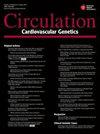Merging Electronic Health Record Data and Genomics for Cardiovascular Research: A Science Advisory From the American Heart Association
Q Medicine
引用次数: 20
Abstract
The process of scientific discovery is rapidly evolving. The funding climate has influenced a favorable shift in scientific discovery toward the use of existing resources such as the electronic health record. The electronic health record enables long-term outlooks on human health and disease, in conjunction with multidimensional phenotypes that include laboratory data, images, vital signs, and other clinical information. Initial work has confirmed the utility of the electronic health record for understanding mechanisms and patterns of variability in disease susceptibility, disease evolution, and drug responses. The addition of biobanks and genomic data to the information contained in the electronic health record has been demonstrated. The purpose of this statement is to discuss the current challenges in and the potential for merging electronic health record data and genomics for cardiovascular research.合并电子健康记录数据和基因组学用于心血管研究:来自美国心脏协会的科学咨询
科学发现的过程正在迅速发展。资金环境影响了科学发现向利用现有资源(如电子健康记录)的有利转变。电子健康记录结合包括实验室数据、图像、生命体征和其他临床信息在内的多维表型,实现了对人类健康和疾病的长期展望。初步工作证实了电子健康记录在理解疾病易感性、疾病演变和药物反应的变异性机制和模式方面的效用。已证明将生物库和基因组数据添加到电子健康记录所包含的信息中。本声明的目的是讨论将电子健康记录数据和基因组学合并用于心血管研究的当前挑战和潜力。
本文章由计算机程序翻译,如有差异,请以英文原文为准。
求助全文
约1分钟内获得全文
求助全文
来源期刊

Circulation-Cardiovascular Genetics
CARDIAC & CARDIOVASCULAR SYSTEMS-GENETICS & HEREDITY
CiteScore
3.95
自引率
0.00%
发文量
0
期刊介绍:
Circulation: Genomic and Precision Medicine considers all types of original research articles, including studies conducted in human subjects, laboratory animals, in vitro, and in silico. Articles may include investigations of: clinical genetics as applied to the diagnosis and management of monogenic or oligogenic cardiovascular disorders; the molecular basis of complex cardiovascular disorders, including genome-wide association studies, exome and genome sequencing-based association studies, coding variant association studies, genetic linkage studies, epigenomics, transcriptomics, proteomics, metabolomics, and metagenomics; integration of electronic health record data or patient-generated data with any of the aforementioned approaches, including phenome-wide association studies, or with environmental or lifestyle factors; pharmacogenomics; regulation of gene expression; gene therapy and therapeutic genomic editing; systems biology approaches to the diagnosis and management of cardiovascular disorders; novel methods to perform any of the aforementioned studies; and novel applications of precision medicine. Above all, we seek studies with relevance to human cardiovascular biology and disease. Manuscripts are examined by the editorial staff and usually evaluated by expert reviewers assigned by the editors. Both clinical and basic articles will also be subject to statistical review, when appropriate. Provisional or final acceptance is based on originality, scientific content, and topical balance of the journal. Decisions are communicated by email, generally within six weeks. The editors will not discuss a decision about a manuscript over the phone. All rebuttals must be submitted in writing to the editorial office.
 求助内容:
求助内容: 应助结果提醒方式:
应助结果提醒方式:


